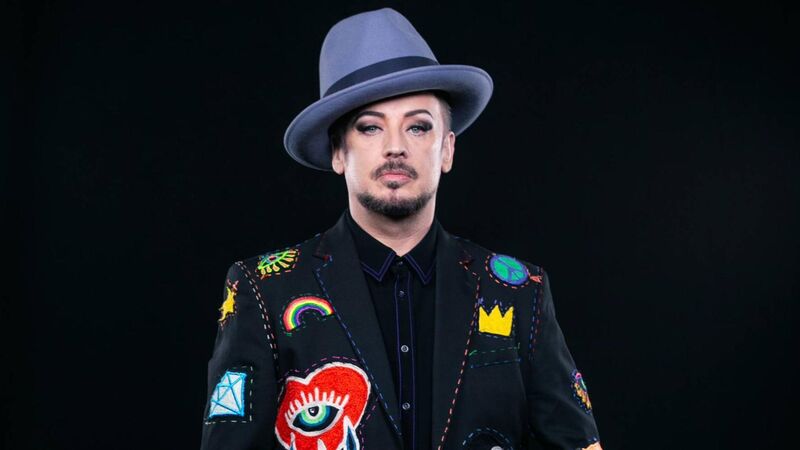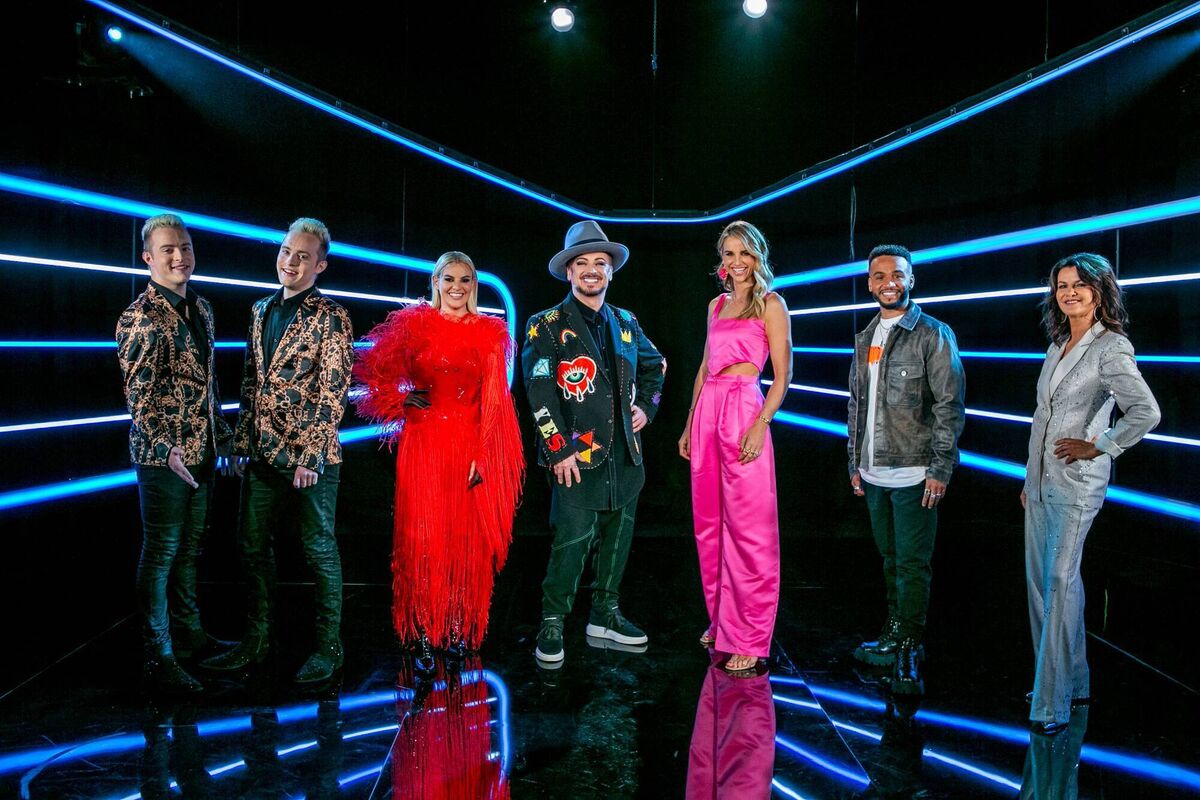Boy George on his new talent show, his Finglas family, and his work ethic

Boy George is one of the judges on The Big Deal on Virgin Media One.
Boy George is sitting in a lounge in Dublin’s 3Arena, trademark oversized grey felt hat, dark suit embellished with the peace symbol, the yin and yang symbol and emblazoned with the word 'LOVE' down the back in coloured thread.
Boy George, given name George Alan O’Dowd, celebrated his 60th birthday in June. He has battled drug addiction and spent time in prison after a conviction for assault and false imprisonment, but here the pop icon now seems fairly confident and content again.
He's been making plenty new music, and has come to Ireland to take part in Virgin Media’s new talent show, The Big Deal. Hosted by Vogue Williams, George joins a panel of judges including comedian Deirdre O’Kane, singer Aston Merrygold, Jedward, and Cork music star Lyra.
But first, let's talk about fashion. “I rarely wear anything designer,” he says when asked about his suit. “I seek out artisan makers and have been very lucky to find some characters who can customise things or make things for me.
"I love fashion and I love the excitement of fashion shows but I never want to turn up in the same jacket as, like, Gary Barlow. I wouldn’t want to wear the same jacket as someone else - and the worst thing is when they look better in it than you.” Cue dirty laugh and flashing green eyes.
George says that the most liberating event of the past five years is his realisation that he needed to get out of his own way creatively. “I’ve finally realised that there is no such thing as originality and if you're worried about being original you’re kind of getting in the way of your own creativity... when you go into the music business you’re basically signing a deal with a bunch of people who know nothing about what you do,” he says.
“It’s an ironic thing that all you ever hear is ‘No’ - ‘You can’t wear this, you can’t do that, you can’t say this, you’re the wrong colour, you’re the wrong sexuality…’ It’s quite amazing when you think [the music industry] is supposed to be this creative bastion. As I’ve got older I have realised that I must have learned something over the past 40-odd years in this business and I feel like I back myself more. I don’t listen to people who can’t do what I do.”
Growing up with his Irish mother Dinah O’Dowd, who left Ireland for the UK when pregnant with George’s older half-brother in 1957, and a father of Irish descent, meant frequent visits to Ireland as a child. Has Ireland changed much since those early visits? “I feel like Ireland has changed but at the same time I think the world has changed a lot. That said, there are a lot of places where change is desperately needed, in fact, in some ways Ireland is ahead of a lot of places.
“I have a lot of relations in Finglas, Dublin and during the same sex marriage referendum it was one of the first places to vote ‘Yes’, so I was really excited about that. I thought ‘It’s got to be something to do with my relatives - there’s a lot of them,” he laughs heartily.
“But yeah, I feel like it’s not necessarily countries, it’s people, it’s often people in power who are frightened of change, frightened of not getting votes...”
Boy George once famously said that he was more interested in having a cup of tea than in having sex and he believes that “homophobes get very excited about what it is they think we get up to”.
“They forget that we have jobs to do, bills to pay, other things to distract us. I joke that my sexuality takes up about four hours a month (if I’m lucky) so people get fixated on what they think we get up to and to a certain extent a lot of images and references to gay culture are very sexualised.”
At 60, he says that his generation grew up with a level of brutality that young people today don’t really understand. “People being hit at home, in the streets, being abused by the media - people saying the most offensive things for which they would be cancelled immediately now. I was always getting hit at school and there was nothing you could do about it. And then of course if you went home and told your father about it, you got hit again. This generation hasn’t had to deal with that and that’s f**king great news.”
Despite the progress, George says he still frequently encounters homophobia today. “I am not saying there’s not work to be done, and that we live in Utopia, but women stand up for themselves more, transgender people are starting to have a voice, LGBTQI+ people are starting to say: ‘I will not tolerate being marginalised’.”
George says he has always been resilient and a “grafter” and that this has helped him find his way out of the many crises he has been through in his personal and professional life. “I have never been shy of work and I’m not precious - when I’ve been in a hole I’ve done whatever is necessary to get out of that hole. When you’re a grafter you’ll find a way out of a crisis. That’s one of the things I value from my upbringing - as soon as I got kicked out of school I was sent down the job centre by my mother.”

He says he is privileged now to be able to choose to work on projects such as The Big Deal: “I love watching Bake Off but I wouldn’t be on it. I love The Chase but I wouldn’t go on it.”
He has already clocked up TV panel experience on on shows such as The Voice UK and The Voice Australia, where his honesty, ability to 'slay' and his unexpected kindness have made him a popular personality. As a judge on The Big Deal, he says he doesn't really know what he’s looking for until he sees it.
“I am looking for honesty. If someone comes on and they’re a little bit fragile that can be so beautiful. I always tell people if they’re meant to do this, nothing will get in their way. “Vulnerability is a massive element to success. Sometimes on these shows the most successful people look nothing like pop stars. When I started out I was called a ‘drag queen’, a ‘circus act’, nobody believed little girls were going to put posters of me on their walls. That beautiful contradiction is still as important as it ever was - that’s why people like Lizzo are successful - it’s about breaking the rules and challenging people’s stereotypes.”
Now that he’s turned his back on the sex, drugs and rock'n'roll lifestyle he says that he gets his kicks from making art and music. This year he’s been releasing tracks online and aims to produce 60 tracks to coincide with turning 60.
The lack of work during the Covid lockdown meant that George sold off the rights to some of his music. He still loves the tunes he has produced through the decades, but isn't keen on just looking to the past.
“I’m only interested in what I am doing now. Nostalgia is a racket. I’m a songwriter, that’s my job.”
He jokes that he makes 20p every time Karma Chameleon is played on the radio and says that signing a record deal is akin to signing a pact with the devil.
Recently going back to making music and writing songs,he describes what he’s doing now as “future nostalgia”. “I feel that my standards are still the same but my expectations are more realistic… This year I’ve been making music in an untraditional and anarchistic way.”
He released an album Cool Karaoke, Vol 1, in January this year and released a new single Best Thing Since Sliced Bread in time for his birthday. “I’m kind of indulging myself. I’ve been told for years that things won’t work or no one will play it and I feel like I don’t give a f**k. I feel like defying the rules will pay dividends for me in the long run.
"I’ve had long periods when I didn't make music, where I was distracted and had dramas in my life and I feel like this year I have really fallen in love with my craft again. It’s been so fulfilling. I didn’t realise how much I love being in the studio and the process of writing a song.”
A new-found love of music. and a new TV show... Boy George is very much back.
- The Big Deal begins on Virgin Media One on, Saturday, September 4
“This year I’ve been able to work out how to do it. I have no training as a musician. I am a storyteller so I write the lyrics and the melody and people make the music and I write over it. I would say it’s like grouting and bricklaying - if you work on it you become better at it. I feel like I’m doing my best work right now.
“I have worked with a vocal coach for four or five years. Also working with an acting coach has, in some ways, been more useful because it relates to physical emotions in the body. I’ve realised how much of a physical thing singing is. In the early part of my career I wanted to be in control - now I want to be out of control."
“This is a fascinating show in that it’s a music show and a game show - it’s been interesting to watch artists who turn down the money and still get sent home. My attitude is to ‘read the room’ and ‘do the math’.
“One person is going to win right? And it’s not a condemnation of your talent to say ‘I’ll take the money and I’ll come back next year’ or ‘I’ll do something else’ because every opportunity creates another opportunity.
“I love variety. I grew up in the 1970s when there were some amazing variety shows and you see the audience - people want to hear different things.
“There used to be a fantastic snobbery about variety shows but now they’ve become part of the mainstream. I think a lot of it is about emotion - a lot of these shows are actually about the emotional journey of the person and that is true of every artist - why do people fall in love with a certain artist? It’s not just the music. You can’t separate the person from what they wear, what they think politically, who they are sexually, what their culture is.”



